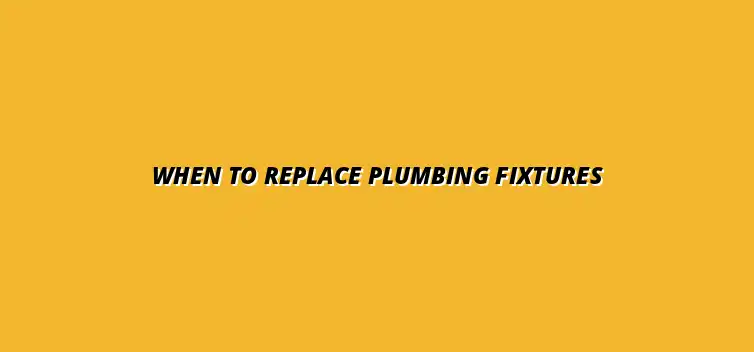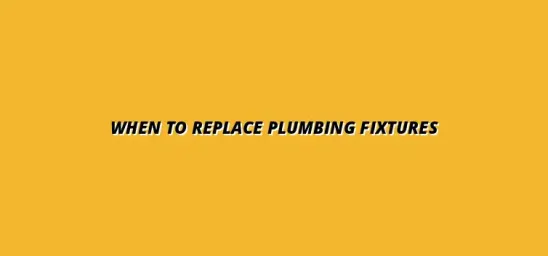
When to Replace Plumbing Fixtures
Understanding the Lifespan of Plumbing Fixtures
Plumbing fixtures are essential elements in our homes, and understanding their lifespan is crucial for maintaining the overall functionality of our plumbing systems. Regularly replacing these fixtures not only helps in preventing unexpected issues but also contributes to the efficiency of our home’s plumbing. By knowing how long different fixtures last, you can plan for replacements and avoid costly repairs.
There are various types of plumbing fixtures, each with its own lifespan. From faucets to toilets, recognizing when it's time to replace them can save you time, money, and hassle in the long run. Let’s dive deeper into why it’s so important to stay on top of plumbing fixture maintenance! For example, knowing when to replace your kitchen sink plumbing can prevent more significant problems down the line.
The Importance of Regularly Replacing Plumbing Fixtures
Regularly replacing plumbing fixtures is vital for several reasons. First, worn-out fixtures can lead to leaks, which may cause water damage in your home. Second, old fixtures can reduce the efficiency of water flow, leading to increased water bills and wasted resources.
- Improved Efficiency: New fixtures tend to be more efficient, saving water and money.
- Enhanced Safety: Replacing old fixtures reduces the risk of corrosion and contamination.
- Increased Property Value: Up-to-date fixtures can enhance the overall appearance and value of your home.
By keeping your plumbing fixtures updated, you’ll not only boost your home’s value but also prevent potential plumbing headaches. Regular maintenance ensures that your home remains a safe and comfortable space. A good annual plumbing maintenance checklist can help you stay on top of things.
Why Maintenance Matters for Home Systems
Maintenance is an essential part of home ownership, especially when it comes to plumbing systems. Regular checks and timely replacements can extend the life of your fixtures, preventing major breakdowns. Plus, a little care goes a long way in saving you money in repairs and water bills!
One of the best things you can do is schedule regular inspections for your plumbing fixtures. This proactive approach allows you to catch any signs of wear before they turn into significant problems. Just like any other system in your home, plumbing systems require attention to function correctly. If you notice problems, you might find helpful advice on how to deal with them in our guide on signs your plumbing needs attention.
The Cost of Neglecting Plumbing Fixture Replacement
Neglecting plumbing fixture replacement can lead to serious financial consequences. Over time, what seems like a minor issue can escalate into costly repairs. Leaks, clogs, and deteriorating materials can all create problems that affect not just your wallet but also your home’s structure!
- Water Damage: A small leak can lead to mold and extensive repairs.
- Increased Bills: Old fixtures waste water, raising your utility costs.
- Health Risks: Corroded fixtures can introduce harmful substances into your water.
Ultimately, understanding the costs associated with ignoring fixture replacement can motivate you to take action. By investing in new fixtures, you can protect your home and your finances in the long run. For example, learning how to unclog your sink with ease can prevent more serious, and expensive, problems.
Common Types of Plumbing Fixtures and Their Lifespans
Knowing the common types of plumbing fixtures and their expected lifespans can help you plan for replacements effectively. Each type of fixture has unique wear and tear, so being aware of this can prevent unexpected breakdowns. Below, we’ll explore some of the most common plumbing fixtures and how long you can typically expect them to last.
In general, it’s wise to keep track of when each fixture was last replaced or serviced. This knowledge empowers you to make informed decisions about when to update your home’s plumbing systems. Let's take a closer look at specific fixtures that may be found in your home! Regular water heater maintenance is also crucial.
Recognizing When It’s Time for a Change
Knowing when to replace your plumbing fixtures can save you both time and money. It’s crucial to watch for signs that indicate the need for a change. By keeping an eye on these warning signs, you can avoid more costly repairs down the line!
Timing is everything! If you notice any issues with your plumbing fixtures, addressing them sooner rather than later can make all the difference. Let's dive into the common signs that suggest it might be time for a replacement. Replacing a faucet yourself can be easier than you think, check out our guide on how to replace your bathroom sink faucet.
Common Signs Indicating Plumbing Fixture Replacement
There are several clear signs that your plumbing fixtures might need replacing. The first thing to inspect is the visible wear and damage to your faucets, toilets, and other fixtures.
- Cracks or chips in the fixture surface
- Discoloration or staining that won't clean
- Loosening of attachments or fittings
Along with visible damage, performance issues can also indicate it's time for a change. Regularly check for:
- Water leaks around the base or joints
- Inconsistent water pressure, especially when multiple fixtures are in use
- Strange noises, like banging or whistling when running water
Visible Wear and Damage: What to Look For
Noticing visible wear can be alarming, but it's a key indicator of the health of your plumbing fixtures. Regular inspections can help catch issues early!
When you look at your fixtures, pay close attention to their condition. If you see excessive rust, corrosion, or signs of leakage, it may be time to replace them. If you need a plumber in Birmingham, particularly in the Billesley area, you can find a local professional here.
Performance Issues: Water Leaks and Inconsistent Pressure
Performance problems can be even more telling than visible damage. Water leaks, for example, not only waste water but can also lead to more serious issues like mold!
If you experience fluctuating water pressure or frequent leaks, it is a strong indicator that your fixtures may need replacing. Addressing these issues promptly can prevent larger problems down the road.
Evaluating Costs and Benefits of Fixture Replacement
Cost is always a consideration when deciding to replace plumbing fixtures. Balancing repair costs and replacement expenses is essential to making the right choice for your home.
Sometimes, it can feel tempting to just fix the existing issues, but let’s explore when replacement might be the smarter choice. Understanding the benefits of new fixtures can also lead to long-term savings!
Weighing Repair Costs Against Replacement Expenses
When evaluating your options, it's helpful to consider the costs involved. To do this effectively, I recommend making a simple comparison:
- Calculate the cost of repairing the current fixture
- Estimate the lifespan of the repaired fixture
- Compare this with the cost of buying a new fixture
Making this comparison can help you see clearly whether repairs are worth it or if a replacement would be a better investment.
Assessing Long-Term Savings with New Fixtures
While the initial cost of new fixtures can seem high, they often come with benefits that save you money in the long run. New fixtures can improve efficiency, leading to lower water bills!
Consider the following potential savings with new plumbing fixtures:
- Reduced water usage
- Less frequency of repairs
- Improved home value
Frequently Asked Questions About Plumbing Fixture Replacement
Many homeowners have questions about when and how to replace plumbing fixtures. I’ve compiled some of the most common queries to help you out!
What is the Average Lifespan for Plumbing Fixtures?
The average lifespan can vary significantly depending on the type of fixture and material used. Generally, faucets can last about 15 years, while toilets may last longer, around 25 years.
How Can I Extend the Lifespan of My Plumbing Fixtures?
To ensure the longevity of your plumbing fixtures, regular maintenance is key! Simple actions like cleaning and inspecting for issues can help extend their lifespan.
Should I Replace All Fixtures at Once?
Replacing all fixtures at once can be a good idea, especially if they’re all nearing the end of their lifespan. However, it’s typically more budget-friendly to replace them as needed.
What Are the Best Practices for Installing New Fixtures?
When installing new fixtures, follow best practices for a successful setup! Ensure you:
- Read the manufacturer’s instructions carefully
- Use quality tools for installation
- Consider hiring a professional if unsure about DIY installation
Final Thoughts on Plumbing Fixture Maintenance
In summary, keeping an eye on your plumbing fixtures and knowing when to replace them is essential for every homeowner. Regular maintenance can help catch potential issues before they become significant problems!
Being proactive about plumbing fixture replacement will not only keep your home running smoothly but also save you money in the long run. Don't hesitate to reach out for expert help when needed!





Fixing a Backed-Up Kitchen Sink
Prepare Your Plumbing for Weather
Installing a Kitchen Sink Drain
When to Replace Plumbing Fixtures
Fixing a Jammed Garbage Disposal